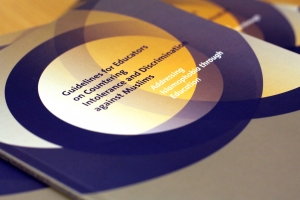OSCE High-Level Meeting Addresses Education against Anti-Muslim Rhetoric

More political leadership and media engagement are needed to confront anti-Muslim rhetoric, said participants in an OSCE high-level meeting held in Vienna on 28 October 2011. OSCE participating States’ governments and other key actors must challenge intolerant public discourse against Muslims, while preserving freedom of expression. The conference organized by Lithuania’s 2011 OSCE Chairmanship and the OSCE Office for Democratic Institutions and Human Rights (ODIHR) gathered some 150 participants, including media professionals, civil society representatives and political representatives from across the OSCE area.
The Vienna event is the third and final in a series of high level meetings co-organized by the OSCE Office for Democratic Institutions and Human Rights (ODIHR) and the Lithuanian OSCE Chairmanship. A conference in Prague held in March was devoted to anti-Semitism in public discourse, while the Rome Conference in September 2011 addressed hate crimes against Christians.
“It is possible to overcome intolerance and discrimination only when all key actors engage and pool their efforts,” said Evaldas Ignatavičius, Lithuanian Deputy Foreign Minister in his opening address to the conference participants. “Unfortunately, we have seen too little leadership from the political sphere and from the media when Muslims were subject to assaults,” he added. Ignatavičius stressed the need to create a continuing process of open reflection, enact necessary laws, develop sustainable educational programmes and build public awareness to eradicate “this heinous form of human rights violation.”
“The promotion of hatred, hostility and bigotry against certain groups based on their ethnic, national, religious or other characteristics runs counter to the core values of the OSCE community,” said the OSCE Secretary General Lamberto Zannier, adding that this transnational phenomenon requires collective and co-operative international and regional responses.
Janez Lenarčič, the Director of ODIHR, said: “The OSCE participating States have reaffirmed the commitment to protect and to promote freedom of expression and the right to equality, by stressing the positive role the media and political representatives can play in combating stereotypes.” Lenarčič underlined the importance of focusing on education to “create a climate where diversity is not only tolerated but also valued.” He encouraged participants to make use of the Guidelines for Educators on Countering Intolerance and Discrimination against Muslims: Addressing Islamophobia through Education co-published by ODIHR, the Council of Europe and UNESCO. “The first of its kind, this document addresses the specific characteristics of intolerance against Muslims and provides practical guidance to educators on how to address this issue in the classroom,” Lenarčič said.
Recommendations from the meeting will be published on the OSCE website.